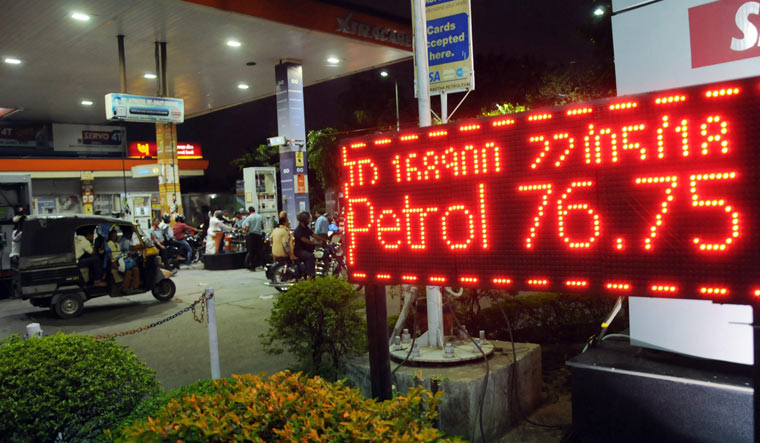Petrol and diesel prices continued its upward rally for the tenth straight day as it touched fresh record highs on Wednesday. Petrol prices peaked at Rs 77.17/litre and Rs 84.99/litre in Delhi and Mumbai, respectively. Diesel prices are at an all-time high of Rs 68.34/litreand Rs 72.76/litre in Delhi and Mumbai, respectively. In the last nine days, petrol price has risen by Rs 2.24 a litre and diesel by Rs 2.15. The prices in Delhi are the cheapest among all metros and most state capitals.

Amid rising criticism over steep hike in fuel prices, senior Congress leader P. Chidambaram on Wednesday claimed it was possible to cut up to Rs 25 per litre in petrol prices but the government will not do so. In a series of tweets, the former finance minister said the bonanza to central government is Rs 25 on every litre of petrol and this money rightfully belongs to the average consumer.

"Central government saves Rs 15 on every litre of petrol due to fall in crude oil prices. Central government puts additional tax of Rs 10 on every litre of petrol. "It is possible to cut up to Rs 25 per litre, but the government will not. They will cheat the people by cutting price by Rs 1 or 2 per litre of petrol," he said on Twitter.
Fuel prices vary from state to state depending on the incidence of local sales tax or VAT. The central government levies Rs 19.48 a litre of excise duty on petrol and Rs 15.33 per litre on diesel.
State sales tax or VAT varies from state to state. Unlike excise duty, VAT is ad valorem and results in higher revenues for the state when rates move up.
In Delhi, VAT on petrol was Rs 15.84 a litre, and Rs 9.68 on diesel in April. Now, it is Rs 16.34 on petrol and Rs 10.02 a litre on diesel.
Every rupee cut in excise duty on petrol and diesel will result in a revenue loss of Rs 13,000 crore. The government had raised excise duty nine times between November 2014 and January 2016 to shore up finances as global oil prices fell, but then cut the tax just once in October last year by Rs 2 a litre.
Subsequent to that excise duty reduction, the Centre had asked states to also lower VAT. Just four of them—Maharashtra, Gujarat, Madhya Pradesh and Himachal Pradesh—reduced rates, while others, including BJP-ruled ones, ignored the call.
In all, duty on petrol rate was hiked by Rs 11.77 per litre and that on diesel by 13.47 a litre in those 15 months that helped governments excise mop up more than double to Rs 2,42,000 crore in 2016-17 from Rs 99,000 crore in 2014-15.
The fresh highs come amid reports suggesting that the Centre is busy crunching numbers to cut the excise duty on petrol and diesel. BJP president Amit Shah had on Tuesday said the government is taking the issue of rising petroleum prices seriously and will soon announce measures to deal with the matter. "The government at the highest level is concerned about it and is taking the matter seriously," he said, adding it will come out with a solution in three-four days. He told a press conference that Petroleum Minister Dharmendra Pradhan is meeting representatives of oil companies and that he is hopeful that a solution will be worked out soon.
With dynamic fuel pricing practice that came into being from June 2017, petrol and diesel prices are revised on a daily basis. However, the state-owned oil firms had paused dynamic fuel pricing for a brief period of 19 days ahead of the Karnataka polls.
Meanwhile, crude oil futures slipped by 0.32 per cent to Rs 4,920 per barrel in futures trading on Wednesday largely in tandem with a weak trend overseas. At the Multi Commodity Exchange, crude oil for delivery in July fell by Rs 16, or 0.32 per cent to Rs 4,920 per barrel in business turnover of 77 lots.
Analysts said the fall in crude oil futures was mostly in tune with a weak trend in the global markets where oil prices edged lower with the possibility of higher OPEC output weighing on the market, although geopolitical risks are expected to keep prices near multi-year highs.
(With inputs from PTI)

